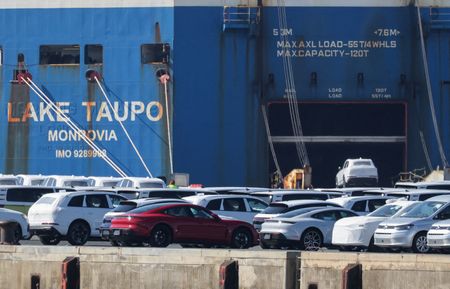By Andrea Shalal and David Lawder
WASHINGTON (Reuters) – U.S. President Donald Trump on Tuesday will soften the blow of his auto tariffs through an executive order mixing credits with relief from other levies on parts and materials, after automakers pressed their case with the administration.
The changes to Trump’s 25% vehicle tariffs will provide auto companies with credits for up to 15% of the value of vehicles assembled domestically. These could be applied against the value of imported parts, allowing time to bring supply chains back home, a senior administration official said.
The official said this would work out to allowing automakers to import duty-free parts worth about 3.75% of the sticker-price value of domestically produced cars they sell in the first year, and 2.5% in the second year. The benefit, retroactive to April 3, phases out in the third year to push companies to move parts production to the U.S.
Moreover, autos and parts subject to those tariffs would no longer be subject to Trump’s other tariffs, including 25% duties on Canadian and Mexican goods, 25% levies on steel and aluminum, as well as 10% duties applied to most other countries.
The change also extends a duty-free exemption for North American parts that comply with the U.S.-Mexico-Canada trade agreement (USMCA) rules of origin.
“If you build your car elsewhere and bring them in on a ship, right, you are going to be at a very, very big disadvantage,” the official said.
In the case of the metals tariffs, auto makers would pay either the vehicle tariff or the steel and aluminum tariffs, whichever is higher, the official said.
NO RELIEF FOR CHINA
A White House official said, however, that the tariff relief would not apply to Chinese parts, which will continue to be subject to Trump’s latest tariffs of at least 145% in addition to any prior duties.
Trump was scheduled to travel to the U.S. auto hub of Michigan on Tuesday to mark his first 100 days in office, during which the Republican president has upended the global economic order. The state is home to the Detroit Three automakers and more than 1,000 major auto suppliers.
Softening the impact of auto levies is his administration’s latest move to show flexibility on tariffs which have sown turmoil in financial markets, created uncertainty for businesses and sparked fears of a sharp economic slowdown.
The first quarterly report on U.S. gross domestic product covering Trump’s term is due out on Wednesday. It is expected to reflect a large drag from the effect of his tariffs, mostly from a record surge in imports as companies and consumers front-loaded purchases of foreign goods to try to beat the new levies. The economy was forecast to have expanded at just a 0.3% annualized rate from January through March, according to a Reuters poll of economists, down from 2.4% in the final three months of 2024.
‘VOLATILITY CONTINUES’
General Motors, CEO Mary Barra, Ford CEO Jim Farley and Stellantis Chairman John Elkann praised the planned changes ahead of the new order’s signing by Trump.
“We believe the president’s leadership is helping level the playing field for companies like GM and allowing us to invest even more in the U.S. economy,” Barra said.
Farley said the changes “will help mitigate the impact of tariffs on automakers, suppliers and consumers.” Elkann said Stellantis looked forward to continued collaboration with the Trump administration “to strengthen a competitive American auto industry and stimulate exports.”
But the uncertainty unleashed across the auto sector by Trump’s tariffs remained on full display Tuesday when GM pulled its annual forecast even as it reported strong quarterly sales and profit. In an unusual move, the carmaker also opted to delay a scheduled conference call with analysts until later in the week, after the details of tariff changes were known.
“Automakers would welcome any exemption, but the volatility continues with the trade policy uncertainty. As we have seen, tariffs can be proposed and revised on short notice. That also doesn’t change the broader business strategy questions facing automakers,” said Lenny LaRocca, KPMG’s U.S. auto industry leader.
Last week, a coalition of U.S. auto industry groups urged Trump not to impose 25% tariffs on imported auto parts, warning they would cut vehicle sales and raise prices.
Earlier, Trump had said he planned to impose tariffs of 25% on auto parts no later than May 3.
“Tariffs on auto parts will scramble the global automotive supply chain and set off a domino effect that will lead to higher auto prices for consumers, lower sales at dealerships and will make servicing and repairing vehicles both more expensive and less predictable,” the industry groups said in the letter.
The letter from the groups representing GM, Toyota Motor, Volkswagen, Hyundai and others, was sent to U.S. Trade Representative Jamieson Greer, Treasury Secretary Scott Bessent and Commerce’s Lutnick.
“Most auto suppliers are not capitalized for an abrupt tariff-induced disruption. Many are already in distress and will face production stoppages, layoffs and bankruptcy,” the letter added, noting “it only takes the failure of one supplier to lead to a shutdown of an automaker’s production line.”
(Additional reporting by Jeff Mason, David Shepardson and Doina Chiacu in Washington and Abhirup Roy in San Francisco; Editing by Leslie Adler, Shri Navaratnam, Kim Coghill, Peter Graff and David Gregorio)












